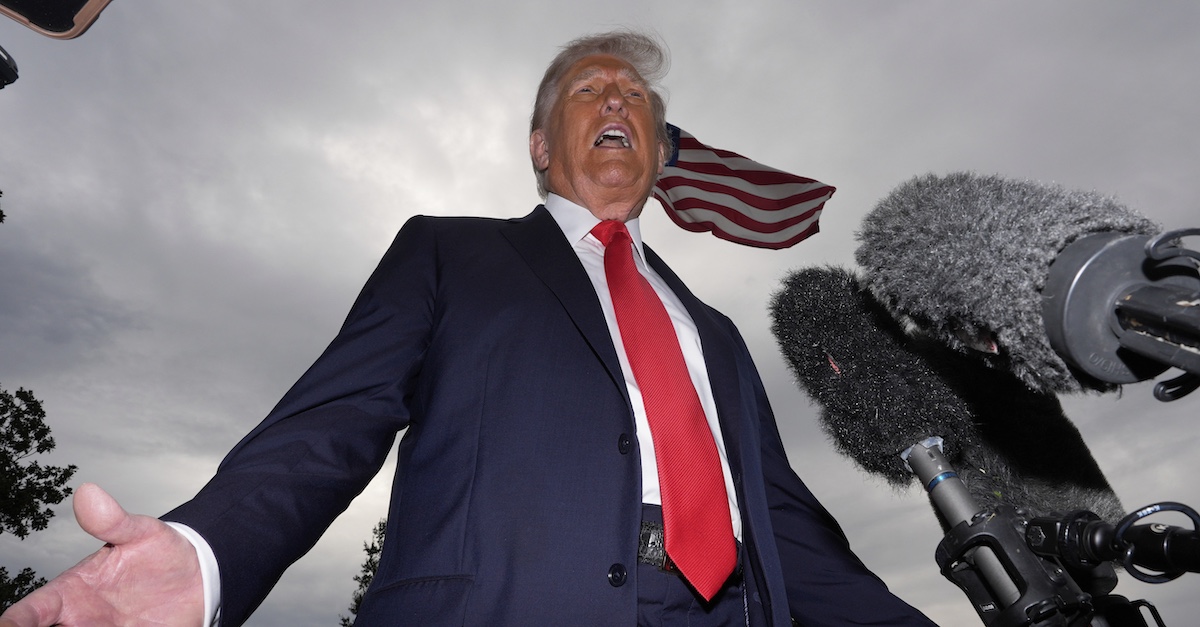
President Donald Trump speaks with reporters before departing on Marine One from the South Lawn of the White House, Tuesday, Sept. 16, 2025, in Washington (AP Photo/Alex Brandon).
Several transgender members of the U.S. Air Force are suing the Trump administration after their retirements were rescinded.
In June, the Air Force issued retirement orders to the 17 plaintiffs involved in the litigation. But then something changed.
In August, "the Air Force rescinded all 17 of these retirement orders" in violation of relevant internal rules, according to the 19-page complaint filed Monday in the U.S. Court of Federal Claims.
The lawsuit is premised on a relatively obscure statute which says the "computation of retired pay" for retired members of the "Air Force or the Space Force" must be based on a certain, related formula.
Love true crime? Sign up for our newsletter, The Law&Crime Docket, to get the latest real-life crime stories delivered right to your inbox.
The plaintiffs say the law on point confers "a substantive right to monetary benefits against the United States to service members."
The locus of the dispute, however, comes from additional statutes.
First, are the long-standing guidelines for Air Force retirement.
According to a handful of relevant statutes, the Air Force secretary, upon a service member's request, can retire an officer "who has at least 20 years of service…at least 10 years of which have been active service as a commissioned officer." Similarly, an enlisted member "who has at least 20, but less than 30, years of service" can be retired.
The plaintiffs in the lawsuit have between 15 and 18 years of service — but claim they are still entitled to retirement pay due to a version of the National Defense Authorization Act (NDAA) passed in 1993.
The NDAA is the annual omnibus spending bill that accounts for direct U.S. military funding as well as military industrial complex contracts. Often, each year's NDAA contains any manner of non-spending laws.
The plaintiffs say the 1993 NDAA explicitly applies to their case.
"Congress authorized the Secretaries of the Army, Navy, and Air Force to make retirement available to members with 15 to 20 years of service, with a deduction of 1% in retirement pay for each year short of 20 years of service," the lawsuit reads.
That exception to the general retirement rules was extended through December of this year in the 2017 NDAA, the lawsuit notes.
From the filing, at length:
In addition, the Department of Defense issued a [Temporary Early Retirement Authority (TERA)] instruction in 2018, in which it reiterated that the Secretaries of the Military Departments—including the Secretary of the Air Force—are authorized until the end of 2025 to make retirement available to members with at least 15 years of service.
But, the plaintiffs insist, none of this is old news — or even plausibly forgotten.
That's because the Air Force reiterated the general exception as late as May this year. And that exception — along with language mimicking the timelines contained in the 2018 TERA — was reiterated in a memorandum specifically about "Voluntary Separations and Retirements." That memo was issued to account for transgender service members leaving the Air Force and Space Force in response to the anti-transgender priorities of the second Trump administration.
The filing puts a point on it: "By providing that 'Service members with 15-18 years of service may request TERA as an exception to policy,' the May 23 Memorandum permitted transgender Air Force and Space Force members with 15–18 years of service to apply for retirement."
So, between June 6 and June 30, all the plaintiffs, all of whom "are subject to the ban on transgender service members" filed for and received retirement notices, the lawsuit explains.
Then, on Aug. 4, in a new memo, Acting Assistant Secretary of the Air Force for Manpower and Reserve Affairs Brian L. Scarlett said he was "disapproving" the 17 requested exceptions. In lieu of retirement pay, Scarlett said the transgender "members are eligible for voluntary separation [pay]" and that "members who elect not to voluntarily separate will be processed for involuntary separation."
The 17 transgender members subsequently received notices saying their previously-approved retirement pay was "rescinded."
In short, the plaintiffs allege the government is trying to stiff them.
"The Voluntary Separation Pay referenced in the August 4 Memorandum pales in comparison to the retirement pay and other benefits to which an approved retirement application would entitle a member with 15-18 years of service," the lawsuit goes on.
Legal fashion, of course, is typically replete with exceptions to exceptions.
But the Air Force's own rules only allow deviations from the standing TERA due to "fraud, manifest error, mathematical error, mistake of law, or substantial new evidence," the lawsuit argues.
Again, the filing, at length:
The Air Force issued retirement orders to each Plaintiff "BY ORDER OF THE SECRETARY OF THE AIR FORCE," thereby entitling them to retirement pay…Under Department of the Air Force Instruction 36-3203, a retirement order may only be rescinded in limited circumstances. No representative of the United States identified any such circumstances. No such circumstances applied to the rescission of Plaintiffs' retirement orders.
"[T]he rescission of Plaintiffs' retirement orders was unlawful and invalid, and Plaintiffs' retirement orders remain valid and effective," the lawsuit continues. "As a direct result of this unlawful and invalid rescission of their retirement orders, Plaintiffs are being deprived of the retirement pay to which they are entitled."
Comments